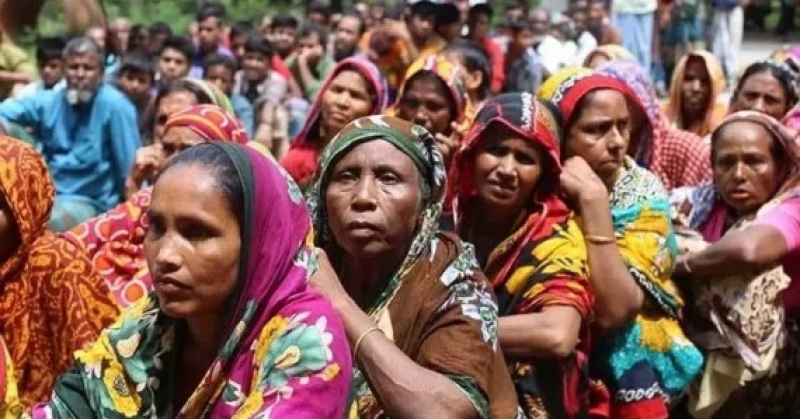- CA urges united efforts to stop food contamination voicing concern |
- Tarique obliquely slams Jamaat for ‘propaganda’ against BNP echoing AL |
- Medical team hopeful about Khaleda’s recovery in Bangladesh |
- Beanibazar green cover shrinks, migratory birds disappear |
- অতিথি পাখির বিচরণ আর দুষ্টুমিতে নান্দনিক হয়ে উঠেছে কুয়াকাটার চর বিজয় |
Flood-hit Kurigram char residents see little hope in politics, elections

Flood affected char people of zkurigram in queues for relief materials recently. UNB_11zon
Kurigram, Nov 7 - In remote char areas of Kurigram, hope has long ebbed away with the shifting currents of the Brahmaputra and its tributaries.
As the national elections draw near, residents of these flood-prone lands say they see little reason to vote as their faith in politics washed away by years of unmet promises and unchanging hardship.
For the people of these transient islands, politics has become an empty word. Votes come, but no change comes in our lives, said several villagers, echoing a sentiment shared across Kurigram’s char communities.
Home to some of Bangladesh’s most impoverished citizens, Kurigram remains at the bottom of the country’s development index.
Government data show that 70.8 percent of its population lives below the poverty line, while 53.2 percent are categorised as extremely poor. Around 60 percent of residents are landless and 57 percent suffer from various diseases.
Life in the char areas is defined not by political boundaries but by rivers -- the Brahmaputra, Dharla, Teesta, and Dudhkumar -- which constantly redraw the map of existence here.
Spanning roughly 800 square kilometres, the chars shelter about 550,000 people, many of whom lose their homes and livelihoods each year to relentless river erosion.
Aminur Rahman, a farmer from Kodalkati Union in Char Rajibpur upazila, spoke with quiet resignation, “During elections, everyone comes smiling, promising roads and work. But when the floods come and the houses are washed away, no one shows up. We don’t have time to think about voting — we spend our days worrying about food.”
For Rahimullah of Kalir Alga Char in Jatrapur Union, elections have become meaningless. “What will happen if we vote? The river breaks, houses are destroyed, there’s no work and no food. Voting doesn’t change any of that.”
Mozammel of Kheruar Char in Nayarhat Union, Chilmari upazila, shared a similar view. “We are people of the river — politics does not touch us. When elections come, people arrive to take pictures, but no one stays afterward.”
As the election season approaches, the usual signs of political excitement are strikingly absent. There are no loudspeakers blaring campaign songs, no processions, and no crowded rallies. The few political leaders who do visit are met with weary indifference.
Social activist Abdul Akher explained why enthusiasm has faded. “The people of the char are no longer interested in politics. They only worry about river erosion and food. They don’t vote because their stomachs are empty.”
Beyond poverty, Kurigram grapples with deep-rooted social challenges, including child marriage and widespread disability.
According to recent data, 91,672 people in the district live with disabilities — many of them in the char regions.
Experts link this to chronic malnutrition, poverty, and teenage motherhood.
Educationist and political analyst Khaja Sharif Uddin Ahmed said the growing disillusionment among char residents stems from years of neglect. “They are submerged in floods for half the year, losing their homes and livelihoods. In this reality, voting has become a luxury for them,” he said.
He warned that unless political parties move beyond promises and prioritise real development and rehabilitation, they risk losing the trust of these forgotten communities altogether.
Kurigram’s infrastructural backwardness, unemployment and recurring natural disasters have kept it among the most neglected districts in the country.
Many displaced families still live in makeshift shelters, waiting for relief that often arrives too late, and never lasts.
Arafat Rahman of Char Bhurungamari in Bhurungamari upazila summed up the prevailing mood, saying, “Voting does not bring jobs or houses. We only see elections on TV, not in real life.”
Survival actually overshadows all else. Karim Mia, an elderly resident of Char Shaulmari Union in Rowmari upazila, said life in the chars is a battle against both hunger and the river itself.
“During elections, we only get words — not work. That’s why we no longer care about voting,” he said quietly, gazing towards the river that has claimed his land more than once.
For Kurigram’s char dwellers, the ballot box holds no promise, he said. “Their struggle continues, not for votes, but for life itself.” - UNB

